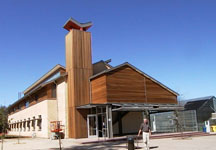
The Carnegie Institution for Science is a private organization that conducts basic research for the benefit of humanity.
December 11, 2014 — PBS Interviews Chris Field at the Peru Climate Talks (at 6:30) more »
December 9, 2014 — Read Newsweek's coverage of Greg Asner's forest mapping work in Peru more »
November 20, 2014 — Listen to Chris Field's interview about the latest IPCC climate report on CCTV ( at about 2:50) more »
September 16, 2014 — Greg Asner 's gold mining work in Peru is featured in the Economist more »
August 4, 2014 — Anna Michalak explains more about Lake Erie algae problem on PBS News Hour (at 2 min.) more »
August 3, 2014 — Watch Anna Michalak's interview on PBS News Hour about the algal bloom in Lake Erie causing water problems in Toledo more »
In Memoriam
Recent News

Friday, September 11, 2015 —New work from an international team including Ken Caldeira demonstrates that the planet’s remaining fossil fuel resources would be sufficient to melt nearly all of Antarctica if burned, leading to a 50- or 60-meter (160- to 200-foot) rise in sea level. Because so many major cities are at or near sea level, this would put many highly populated areas where more than a billion people live under water, including New York City and Washington, DC. It is published in Science Advances. more »

Tuesday, August 4, 2015—Climate change caused by greenhouse gas emissions will alter the way that Americans heat and cool their homes. By the end of this century, the number of days each year that heating and air conditioning are used will decrease in the Northern states, as winters get warmer, and increase in Southern states, as summers get hotter, according to a new study from a high school student, Yana Petri, working with DGE’s Ken Caldeira. It is published by Scientific Reports. more »

Monday, August 3, 2015—Continuing current carbon dioxide (CO2) emission trends throughout this century and beyond would leave a legacy of heat and acidity in the deep ocean. These changes would linger even if the atmospheric carbon dioxide concentration were to be restored to pre-industrial levels at some point in the future, according to a new Nature Climate Change paper from an international team including DGE’s Ken Caldeira. This is due to the tremendous inertia of the ocean system. more »

Tuesday, July 28, 2015 —Carnegie investigator Greg Asner has been elected a Fellow of the American Geophysical Union (AGU). He is one of 60 new members. The honor is given “to individual AGU members who have made exceptional scientific contributions and attained acknowledged eminence in the fields of Earth and space sciences.”
Asner was hired as the Department of Global Ecology’s first addition in 2001. He has pioneered new methods for investigating tropical deforestation, degradation, ecosystem diversity, invasive species, carbon emissions, climate change, and much more using satellite and airborne instrumentation, coupled with on-ground fieldwork. His innovative techniques measure the chemistry, structure, biomass, and biodiversity of the Earth in unprecedented detail over massive areas not thought possible before. more »






